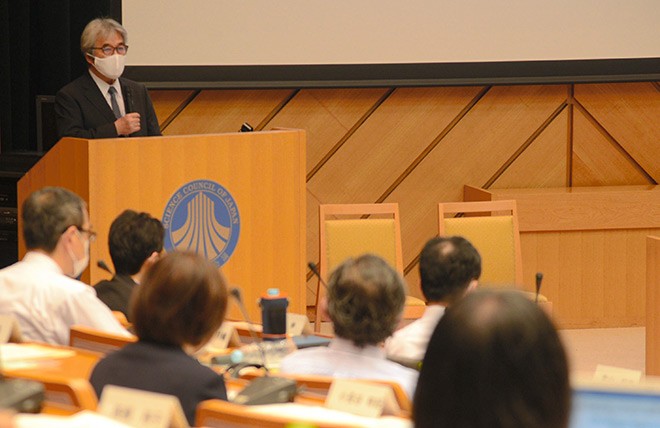 Juichi Yamagiwa, the outgoing president of the Science Council of Japan, speaks at a council meeting on Oct. 1. (Image via Asahi)
Juichi Yamagiwa, the outgoing president of the Science Council of Japan, speaks at a council meeting on Oct. 1. (Image via Asahi)
Refusing to appoint new science council, Suga faces backlash
On Friday, the Prime Minister (PM) of Japan, Yoshihide Suga, was facing backlash when he refused to appoint 6 academics having been acting critical for Japan's security and anti-conspiracy legislation to the Science Council of Japan, a think-tank that scrutinizes and makes policy recommendations to the Japanese government. Based on the law of the Science Council of Japan, the organization - running since 2004 - acts independently under the jurisdiction of the PM.
The Science Council of Japan was established in January 1949, serving to promote and enhance the science field in Japan and have it reflected in Japan's aspect of society from the government to ordinary lives. Consisting of some 210 members and 2,000 associates, the Science Council of Japan makes policy recommendations to the government and public.
From 105 people recommended on Thursday, Suga refused to name six and he did not give any specific reasons why. The Chief Cabinet Secretary, Katsunobu Kato, said that the PM does not have the obligation to appoint the recommended people to the council either. While it is true that the appointment is under the legal jurisdiction of the PM, but the government will appoint the members based on its own assessment, said Kato. Furthermore, the top government spokesman declined to give the reasons why and the PM's decision is irreversible, yet will not affect the research of the Science Council of Japan.
The President of the Science Council and a 2015 Nobel Physics winner, Takaaki Kajita, stated that the organization actually is curious about the PM's outrageous decision and urge the appointment of the six recommended figures. One of the excluded six and a Penal Code Professor at Ritsumeikan University, Takaaki Matsumiya, stated that Suga's baseless refusal would raise constitutional questions. Previously in 2017, Matsumiya once spoke at the Diet against the "Conspiracy Bill", aiming at thwarting terrorism but creating concern for the suppression of civil liberties.
Another from the six and a Constitution Professor at Jikei University School of Medicine, Ryuichi Ozawa, also referred to Suga's move as a "major infringement of academic freedom". This is the same Ozawa who spoke against Japan's security legislation and rights to collective self-defense, calling it "unconstitutional".
Here is the list of the six prominent figures debunked by Suga:
1. Takaaki Matsumiya (Ritsumeikan University);
2. Ryuichi Ozawa (Jikei University School of Medicine);
3. Masanori Okada (Waseda University);
4. Shigeki Uno (University of Tokyo);
5. Yoko Kato (University of Tokyo); and
6. Sadamichi Ashina of Kyoto University.
Seizing the opportunity, the opposition, and other parties called for Suga's explanation on the matter. Komeito party, a junior coalition party to the majority Liberal Democratic Party (LDP), urged Suga's administration to explain as thoroughly as possible.
Source: https://bit.ly/3jlZ4DD
 English
English Japan
Japan
